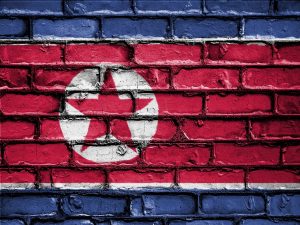Diplomat author Mercy Kuo regularly engages subject-matter experts, policy practitioners, and strategic thinkers across the globe for their diverse insights into U.S. Asia policy. This conversation with Lucas Kuo – senior analyst at C4ADS and co-author of “Black Gold: Exposing North Korea’s Oil Procurement Networks,” a collaborative publication between the Center for Advanced Defense Studies (C4ADS) in Washington, D.C. and Royal United Services Institute (RUSI) in London – is the 269th in “The Trans-Pacific View Insight Series.”
Briefly explain North Korea’s fuel-procurement strategy.
North Korea is completely dependent on foreign sources of fuel for its economy, military, and weapons program. The U.N. Security Council first imposed caps on North Korea’s fuel imports in 2017, but it has breached them every year since.
North Korea’s illicit oil supply chain relies on both foreign and North Korean tankers participating in a “shuttle system” in which fuel from onshore facilities is transferred over successive STS [ship-to-ship] transfers before being delivered directly to North Korea. Effectively, we’re seeing what anti-money laundering specialists call “layering” in financial transactions, where each successive step in the supply chain makes it harder for investigators to connect North Korea to the point of original sale on shore. Our analysis suggests that transnational smuggling syndicates orchestrate these complex deliveries, not only for North Korea but also for others in a vibrant regional black market for oil.
Describe the role of China and Taiwan in this strategy.
China and Taiwan are important logistical hubs in the shuttle system. DPRK-linked tankers — including ones that have been sanctioned by the U.N. — often anchor in Chinese waters near Fujian province in between procurement or delivery voyages. Across the strait, the waters north of Taipei and south of Kaohsiung have become hotspots where DPRK-linked tankers procure fuel via STS transfers.
Differences in the oil pricing regimes in China and Taiwan have created significant arbitrage opportunities in cross-strait fuel trade, which in turn have attracted experienced and well-established smuggling syndicates into the market. For example, China sets a price floor for retail oil products to protect domestic refineries, and Taiwan allows foreign tankers to purchase diesel fuel duty-free at ports designated as free trade zones. North Korea benefits from the black market these patchwork policies have produced, and from the powerful commercial players that participate.
Explain the function of Singapore-based Winson Group in North Korea’s oil procurement.
Founded in 1998, the Winson Group is a private oil trading and shipping company that is headquartered in Singapore and has offices across Asia. Winson is an industry powerhouse that, as of March 2021, owned or managed dozens of oil tankers and had access to billions of dollars in credit facilities, according to maritime databases and financial documents.
Our report identified multiple DPRK-linked oil shipments between 2017 and 2020 that appear to trace back to Winson Shipping Taiwan, the Kaohsiung-based office of the Winson Group. Notably, our report — as well as an investigation by the New York Times — found that two tankers linked to Winson Shipping Taiwan had repeatedly met with the DIAMOND 8 in 2020, the largest foreign-flagged tanker known to have delivered fuel to North Korea.
In addition, our investigation uncovered several other companies and individuals linked to ships involved with DPRK fuel smuggling that have commercial ties to the Winson Group. Winson’s relationship with other DPRK-linked networks as well as its possible direct involvement with DPRK-linked shipments suggest that the company appears to be a key node in North Korea’s illicit fuel supply chain.
How is North Korea’s fuel supply chain tied to criminal networks?
The long-standing black market for fuel in Asia has nurtured sophisticated smuggling networks with the capacity to deliver fuel to North Korea despite a significant international monitoring mission. Our investigation found that that many illicit shipments of fuel to North Korea in 2020 could be traced back to individuals with established links to organized crime, smuggling, and bribery cases. We have seen North Korea work with organized crime in historical cases of illicit revenue generation, but our analysis is fresh evidence that crime and corruption continue to undermine more recent nonproliferation efforts.
Identify ways in which the U.N., U.S., EU, and Asian governments can hold Pyongyang accountable for illicit oil procurement practices.
The international community should make more effective use of publicly available information in the monitoring and verification mission on North Korea. Our investigation shows just how much actionable information can be produced from unclassified sources, which can be easily shared with media, customs authorities, financial institutions, and other regional partners who are on the frontlines of enforcing U.N. sanctions on North Korea.
One of the leading institutions in this effort whose mission may benefit from greater information sharing and integration with publicly available information is the Enforcement Coordination Cell (ECC). The ECC is the multinational coalition led by the U.S. and its partner countries in the Five Eyes alliance (Australia, Canada, New Zealand, and the U.K.) as well as France, Japan, and South Korea that monitors DPRK maritime sanctions evasion, including tracking the tankers supplying illicit fuel to Pyongyang. The ECC generates a wealth of intelligence on fuel smuggling activities in the region, which should be regularly declassified to better inform non-member states (including China and Taiwan), the U.N., and stakeholders in the finance, shipping, and oil industries about the environment in which DPRK oil procurement networks operate. Given the complex and transnational nature of the problem, the flexibility offered by publicly available information can provide a powerful supplementary capability to governments to engage a broader range of stakeholders.

































